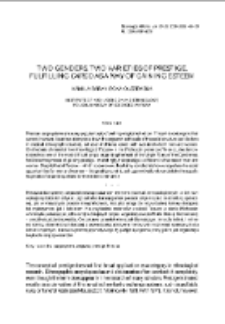
Object
Title: Two Genders, Two Varieties of Prestige. Fulfilling Cargo As a Way of Gaining Esteem
Subtitle:
Ethnologia Polona 29-30 (2008-2009)
Publisher:
Institute of Archaeology and Ethnology Polish Academy of Sciences
Place of publishing:
Description:
Type of object:
Abstract:
Mexican cargo systems are a very popular topic of anthropological reflection. This article belongs to that current; however, its author attempts to show the cargos not as the axis of the social structure (as it is done in classical ethnographic studies), but as an individual career path available to both men and women. On the basis of material from the village of Tócuaro in the Michoacán province of Mexico, she demonstrates how one of the most difficult cargos, organising the feast of the Virgin Mary of the Candlemas, facilitates the process of gaining prestige. Interestingly, this prestige is different in the case of men and women. Despite that difference – which to some would certainly corroborate how unequal are the social opportunities for men and women – this prestige constitutes huge motivation to undertake the equally huge task of organising a feast for the entire community
References:
Beals Ralph L., 1946, Cherán: A Sierra Tarascan Village, Smithsonian Institution, Washington
Carrasco Pedro, 1961, The Civil-Religious Hierarchy in Mesoamerican Communities: Pre-Spanish Background and Colonial Development, American Anthropologist, vol. 63, no. 3, pp. 483–497
Domański Henryk, 1999, Prestiż, Funna, Wroclaw
Firth Raymond, 1971, Elements of Social Organization, Routledge, London
Foster George, 1948, Empire’s Children. The People of Tzintzuntzan, Smithsonian Institution, México
Gregory James R., 1975, Image of Limited Good, or Expectation of Reciprocity?, Current Anthropology, vol. 16, no. 1., pp. 73–92
Loewe Ron, 2003, Marching with San Miguel: Festivity, Obligation, and Hierarchy in a Mexican Town, Journal of Anthropological Research, vol. 59, pp. 463–486
Malinowski Bronisław, 1981, Argonauci Zachodniego Pacyfiku: relacje o poczynaniach i przygodach krajowców z Nowej Gwinei, [in:] idem, Dzieła, vol. 3, PNW, Warsaw
Mathews Holly F., 1985, “We are Mayordomo”: A Reinterpretation of Women’s Roles in the Mexican Cargo system, American Ethnologist, vol. 12, no. 2, pp. 285–301
Mauss Marcel, 2001, Szkic o darze, [in:] idem, Socjologia i antropologia, Wydawnictwo KR, Warsaw, pp. 163–306
Monaghan John, 1990, Reciprocity, Redistribution, and the Transaction of Value in the Mesoamerican Fiesta, American Ethnologist, vol. 17, no. 4, pp. 758–774
Monaghan John, 1996, Fiesta Finance in Mesoamerica and the Origins of a Gift Exchange System, The Journal of the Royal Anthropological Institute, vol. 2, no. 3, pp. 499–516
Zantwijk Van Rudolf A. M., 1967, Servants of the Saints: the Social and Cultural Identity of a Tarascan Community in Mexico, Van Gorcum, Assen
Relation:
Volume:
Start page:
End page:
Detailed Resource Type:
Format:
Resource Identifier:
oai:rcin.org.pl:61473 ; 0137-4079
Source:
IAiE PAN, call no. P 366 ; IAiE PAN, call no. P 367 ; IAiE PAN, call no. P 368 ; click here to follow the link
Language:
Digitizing institution:
Institute of Archaeology and Ethnology of the Polish Academy of Sciences
Original in:
Library of the Institute of Archaeology and Ethnology of the Polish Academy of Sciences
Access:
Object collections:
- Digital Repository of Scientific Institutes > Partners' collections > Institute of Archeology and Ethnology PAS > Institute Publications
- Digital Repository of Scientific Institutes > Partners' collections > Institute of Archeology and Ethnology PAS > Institute Publications > Current Journals
- Digital Repository of Scientific Institutes > Literature > Journals/Articles
- Digital Repository of Scientific Institutes > Partners' collections > Institute of Archeology and Ethnology PAS > Institute Publications > Current Journals > Ethnologia Polona
Last modified:
Feb 2, 2022
In our library since:
Jan 10, 2017
Number of object content downloads / hits:
36
All available object's versions:
https://rcin.org.pl/publication/76162
Show description in RDF format:
Show description in RDFa format:
Show description in OAI-PMH format:
Objects Similar
Tenenbaum, Szymon (1892–1941)
Kadrow, Sławomir (1956– )
Cortés, Hernán (1485–1547) Schultze, Ernst (1874–1943)
Kowalski, Mariusz

 INSTYTUT ARCHEOLOGII I ETNOLOGII POLSKIEJ AKADEMII NAUK
INSTYTUT ARCHEOLOGII I ETNOLOGII POLSKIEJ AKADEMII NAUK
 INSTYTUT BADAŃ LITERACKICH POLSKIEJ AKADEMII NAUK
INSTYTUT BADAŃ LITERACKICH POLSKIEJ AKADEMII NAUK
 INSTYTUT BADAWCZY LEŚNICTWA
INSTYTUT BADAWCZY LEŚNICTWA
 INSTYTUT BIOLOGII DOŚWIADCZALNEJ IM. MARCELEGO NENCKIEGO POLSKIEJ AKADEMII NAUK
INSTYTUT BIOLOGII DOŚWIADCZALNEJ IM. MARCELEGO NENCKIEGO POLSKIEJ AKADEMII NAUK
 INSTYTUT BIOLOGII SSAKÓW POLSKIEJ AKADEMII NAUK
INSTYTUT BIOLOGII SSAKÓW POLSKIEJ AKADEMII NAUK
 INSTYTUT CHEMII FIZYCZNEJ PAN
INSTYTUT CHEMII FIZYCZNEJ PAN
 INSTYTUT CHEMII ORGANICZNEJ PAN
INSTYTUT CHEMII ORGANICZNEJ PAN
 INSTYTUT FILOZOFII I SOCJOLOGII PAN
INSTYTUT FILOZOFII I SOCJOLOGII PAN
 INSTYTUT GEOGRAFII I PRZESTRZENNEGO ZAGOSPODAROWANIA PAN
INSTYTUT GEOGRAFII I PRZESTRZENNEGO ZAGOSPODAROWANIA PAN
 INSTYTUT HISTORII im. TADEUSZA MANTEUFFLA POLSKIEJ AKADEMII NAUK
INSTYTUT HISTORII im. TADEUSZA MANTEUFFLA POLSKIEJ AKADEMII NAUK
 INSTYTUT JĘZYKA POLSKIEGO POLSKIEJ AKADEMII NAUK
INSTYTUT JĘZYKA POLSKIEGO POLSKIEJ AKADEMII NAUK
 INSTYTUT MATEMATYCZNY PAN
INSTYTUT MATEMATYCZNY PAN
 INSTYTUT MEDYCYNY DOŚWIADCZALNEJ I KLINICZNEJ IM.MIROSŁAWA MOSSAKOWSKIEGO POLSKIEJ AKADEMII NAUK
INSTYTUT MEDYCYNY DOŚWIADCZALNEJ I KLINICZNEJ IM.MIROSŁAWA MOSSAKOWSKIEGO POLSKIEJ AKADEMII NAUK
 INSTYTUT PODSTAWOWYCH PROBLEMÓW TECHNIKI PAN
INSTYTUT PODSTAWOWYCH PROBLEMÓW TECHNIKI PAN
 INSTYTUT SLAWISTYKI PAN
INSTYTUT SLAWISTYKI PAN
 SIEĆ BADAWCZA ŁUKASIEWICZ - INSTYTUT TECHNOLOGII MATERIAŁÓW ELEKTRONICZNYCH
SIEĆ BADAWCZA ŁUKASIEWICZ - INSTYTUT TECHNOLOGII MATERIAŁÓW ELEKTRONICZNYCH
 MUZEUM I INSTYTUT ZOOLOGII POLSKIEJ AKADEMII NAUK
MUZEUM I INSTYTUT ZOOLOGII POLSKIEJ AKADEMII NAUK
 INSTYTUT BADAŃ SYSTEMOWYCH PAN
INSTYTUT BADAŃ SYSTEMOWYCH PAN
 INSTYTUT BOTANIKI IM. WŁADYSŁAWA SZAFERA POLSKIEJ AKADEMII NAUK
INSTYTUT BOTANIKI IM. WŁADYSŁAWA SZAFERA POLSKIEJ AKADEMII NAUK


































